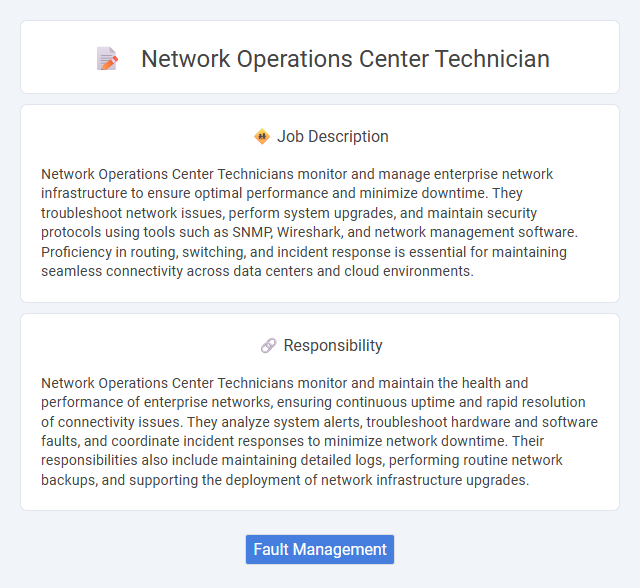
Network Operations Center Technicians monitor and manage enterprise network infrastructure to ensure optimal performance and minimize downtime. They troubleshoot network issues, perform system upgrades, and maintain security protocols using tools such as SNMP, Wireshark, and network management software. Proficiency in routing, switching, and incident response is essential for maintaining seamless connectivity across data centers and cloud environments.
People with strong problem-solving skills and the ability to work under pressure are likely suitable for a Network Operations Center Technician role. Those who prefer routine tasks and minimal interaction with technical systems may find the job challenging. Candidates with a proactive mindset and attention to detail probably thrive in this dynamic environment.
Qualification
A Network Operations Center (NOC) Technician must possess strong expertise in network monitoring tools such as SolarWinds, Nagios, or PRTG, alongside proficiency in TCP/IP, DNS, and routing protocols like BGP and OSPF. Certifications like CompTIA Network+, Cisco CCNA, or Juniper JNCIA are highly valued to validate technical skills and industry knowledge. Strong problem-solving abilities, experience with incident management systems, and basic scripting skills in Python or Bash enhance operational efficiency in managing network performance and troubleshooting issues.
Responsibility
Network Operations Center Technicians monitor and maintain the health and performance of enterprise networks, ensuring continuous uptime and rapid resolution of connectivity issues. They analyze system alerts, troubleshoot hardware and software faults, and coordinate incident responses to minimize network downtime. Their responsibilities also include maintaining detailed logs, performing routine network backups, and supporting the deployment of network infrastructure upgrades.
Benefit
A Network Operations Center Technician likely experiences significant benefits such as skill development in network monitoring and troubleshooting, which enhances career growth opportunities. They probably enjoy a dynamic work environment that fosters problem-solving and technical proficiency. Job stability and competitive compensation are also common advantages associated with this role.
Challenge
Network Operations Center Technicians likely face the challenge of rapidly diagnosing and resolving complex network issues to minimize downtime and maintain system performance. The role probably demands constant vigilance and quick decision-making in high-pressure situations to ensure continuous network connectivity. Managing the unpredictable nature of network failures may require a strong ability to adapt and prioritize effectively.
Career Advancement
Network Operations Center Technicians gain crucial experience monitoring and maintaining network infrastructure, laying a strong foundation for career growth in IT and telecommunications. Mastery of network protocols and incident management tools positions them for roles such as Network Engineer or Systems Administrator. Continuous skill development and certifications like CCNA or CompTIA Network+ accelerate advancement to senior technical or managerial positions.
Key Terms
Fault Management
Network Operations Center Technicians specializing in Fault Management monitor network infrastructure to identify, diagnose, and resolve faults promptly, ensuring minimal downtime and optimal performance. They utilize advanced fault detection tools and protocols such as SNMP, syslog, and event correlation systems to pinpoint issues across routers, switches, and firewalls. Effective fault management reduces incident response times and improves overall network reliability and service continuity.
 kuljobs.com
kuljobs.com